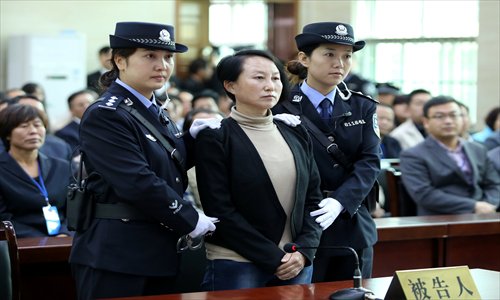'House Sister' stands trial for illegal hukou

Gong Aiai, a former bank executive in Shenmu county, Shaanxi Province, stands trial at the Jingbian County People's Court on Tuesday. Photo: CFP
The former bank executive in Shaanxi Province who reportedly owns 41 properties in Beijing and has four sets of illegal residence registration permits, or hukou, denied the charges of forging and trading official documents during a trial on Tuesday.
No verdict was given on Gong Aiai by the Jingbian County People's Court in Yulin of the province.
Local prosecutors said Gong, former deputy head of the Shenmu County Rural Commercial Bank in Yulin, got two sets of hukou in Shenmu county, she also bought two sets of Beijing hukou in 2005, when she was buying properties in the capital.
Chinese law only allows one set of hukou per citizen. The properties were later found to be registered under three sets of hukou, earning Gong the nickname "house sister."
The criminal law stipulates that those who forge and trade official documents can be sentenced for up to 10 years if it is deemed to be severe.
However, Gong said that she wasn't involved in forging the hukou, noting that she didn't pay to get her Beijing hukou as she was promised it when purchasing the property.
Lian Gaobo, Gong's lawyer, told the Global Times that even though the property trader testified that Gong gave him 300,000 yuan ($48,960) for the Beijing hukou, there's no evidence showing that Gong wired him the money.
The case involves police officers in Beijing, Shaanxi and Shanxi provinces as two of the illegal sets of hukou were first registered in Shanxi and transferred to Shenmu in Shaanxi. Five police officers in Shenmu stood trial Tuesday on charges of duty neglect and forging documents.
Zhang Shenxin, one of the officers, said that he just did an assignment from his superior, people.com.cn reported.
"The two sets of hukou in Shenmu did not require a payment from Gong, neither did Gong know how the two sets were registered. It was the police who forged the hukou," Lian said, noting that Gong didn't know that holding more than one set of hukou was illegal and this problem is common in Shenmu.
In January, online whistle-blowers exposed that Gong owned a large number of properties in Beijing under her fake IDs, arousing public outrage. Net users have also questioned why the trial on Tuesday didn't cover Gong's properties.
"The police didn't find any problems in Gong's property ownership during their investigation," said Lian, noting that the bank for which Gong works is a private enterprise.
Calls to the prosecutor's office in Jingbian by the Global Times went unanswered as of late Tuesday.
An earlier Global Times report revealed that Gong allegedly amassed her wealth via the coal industry, using loopholes in the rules regarding the transfer of State-owned assets and private lending.